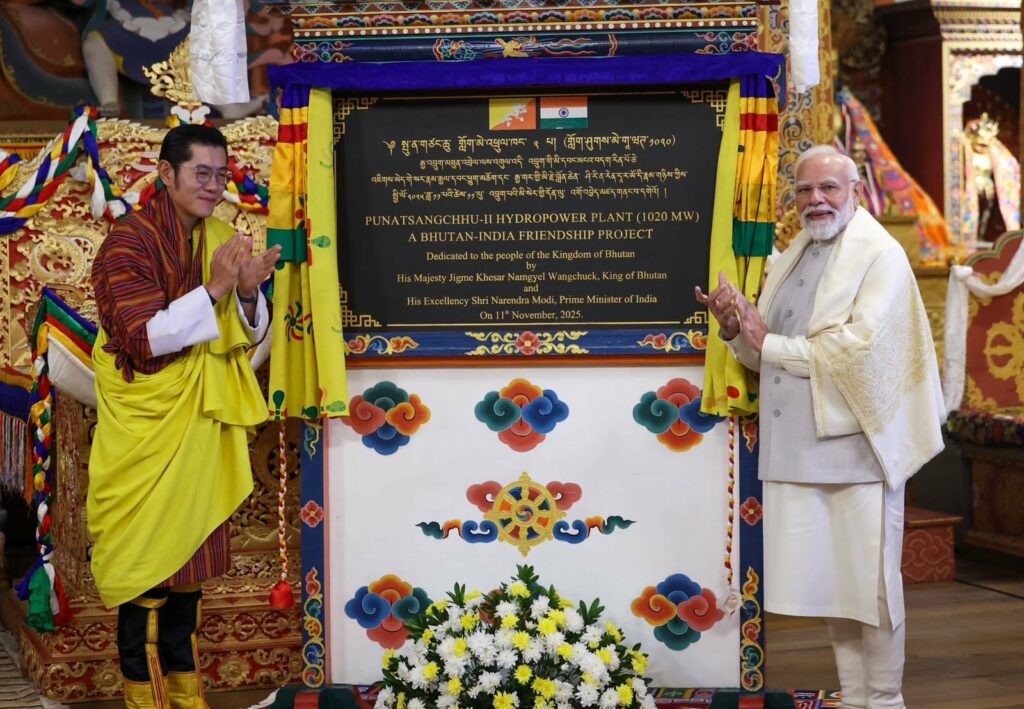
- Prime Minister Modi jointly inaugurated the 1,020 MW Punatsangchhu-II hydroelectric project and promised that India would support Bhutan’s 13th Five-Year Plan.
- India will also extend a line of credit worth ₹40 billion for Bhutan’s energy projects, while both sides agreed to cooperate on developing inland waterways and a multimodal logistics park in Bhutan.
- Bangladesh’s post-2024 shift toward a radical, Pakistan-aligned regime has heightened challenges on India’s eastern frontier, making Bhutan’s strategic alignment with India even more crucial.
- With Pakistan deepening military ties with Bangladesh and positioning naval assets there, India must reinforce partnerships with like-minded neighbours, making Bhutan an indispensable pillar of its regional security and strategic balance.
Prime Minister Modi concluded his two-day visit to the Himalayan nation of Bhutan. The visit took place following an invitation from the Bhutanese King Jigme Khesar Namgyel Wangchuck. Prime Minister Modi received a thunderous welcome in Bhutan, and the talks focused on matters related to energy, trade, technology, and connectivity.
This visit comes at a time when India-Bhutan relations are at their closest in recent years. There have been multiple visits by the Bhutanese Prime Minister to India, and this was the reciprocal visit by the Indian Prime Minister.
During the welcome ceremony, Bhutanese Prime Minister Tshering Tobgay described Prime Minister Modi as a “spiritual master.” Prime Minister Modi held bilateral meetings with both the Bhutanese Prime Minister and the Fourth Druk Gyalpo, the former King of Bhutan.
During the visit, Prime Minister Modi expressed appreciation for Bhutan’s Gelephu Mindfulness City project. Several Memoranda of Understanding (MoUs) were signed between India and Bhutan, including an agreement to establish a railway line connecting Bhutan’s new city of Gelephu with Kokrajhar in India.
Prime Minister Modi was also the Guest of Honour at the 70th birth anniversary celebrations of the King of Bhutan. The Bhutanese King expressed his gratitude for the presence of the Piprahwa relics of Lord Buddha during the event. India also agreed to support Bhutan’s 13th Five-Year Plan, and Prime Minister Modi jointly inaugurated the 1,020 MW Punatsangchhu-II hydroelectric project.
Additionally, the Indian government extended a line of credit worth ₹40 billion for Bhutan’s energy projects. Both sides agreed to cooperate on developing inland waterways and a multimodal logistics park in Bhutan. Other MoUs were also signed covering sectors such as STEM, fintech, renewable energy, health, and medicine.
Bhutan – India’s Geopolitical partner in South Asia
Geopolitically, Bhutan holds immense importance for India as a Himalayan buffer state between Tibet (annexed by China) and India. A stronger Indian presence in Bhutan is crucial for maintaining regional balance and countering China’s growing influence in South Asia. In recent years, China has been attempting to deepen ties with India’s neighbouring countries and adversaries, thereby increasing its strategic reach.
Bhutan’s geographic location makes it particularly significant for India, as it lies north of the strategically important Siliguri Corridor, also known as the “Chicken’s Neck” — a narrow stretch of land connecting mainland India to its northeastern states. India’s presence in Bhutan thus helps safeguard this vital link and ensures strategic visibility in the region.
The importance of India-Bhutan relations was notably highlighted in 2017 during the Doklam standoff, when China attempted to construct a road in the disputed Doklam Plateau region between Bhutan and China. India, owing to its close ties with Bhutan, successfully intervened and halted China’s construction efforts.
However, the regional geopolitical scenario has evolved since 2024. Bangladesh has witnessed the rise of a radical regime that has increasingly aligned itself with Pakistan and other forces hostile to India. This development poses a new challenge to India’s eastern frontier. In this context, Bhutan’s strategic and political alignment with India becomes even more significant.
India has also recently issued NOTAMs (Notice to Airmen) in the northeastern region amid rising tensions, as reports indicate Pakistani naval vessels are being stationed at Bangladeshi ports and growing military interactions between Pakistan and Bangladesh. Pakistan’s intentions to use Bangladesh as a platform against India cannot be ignored.
Given this changing regional landscape, India must continue to deepen and diversify its partnerships with like-minded neighbouring countries. In this regard, Bhutan remains an indispensable ally for India’s strategic balance and regional security.
Aayush Pal is a freelance writer on contemporary geopolitical developments. The views expressed in his work are entirely his own.
